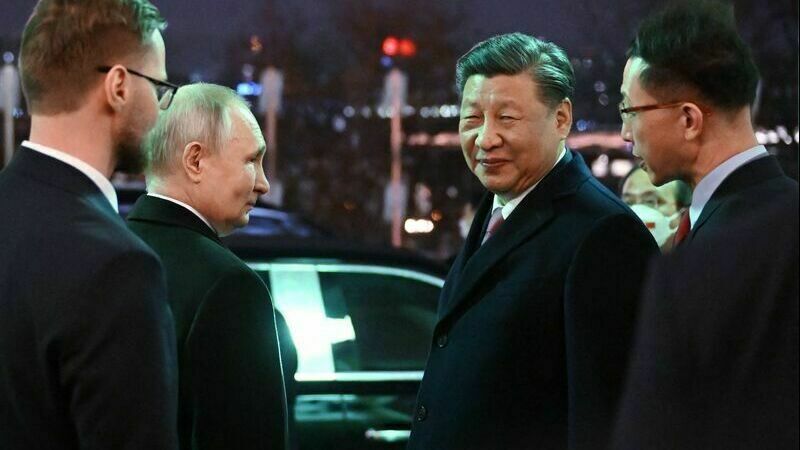Posted 7 апреля 2023, 11:50
Published 7 апреля 2023, 11:50
Modified 7 апреля 2023, 12:27
Updated 7 апреля 2023, 12:27

Bloomberg: Xi Jinping and Vladimir Putin launch an ideological counterattack
The website of the analytical agency Bloomberg published an article by columnist Pankaj Mishra about why the idea of anti-globalism and its leaders Xi Jinping and Putin are so popular in the world.
"After several months of listening to US President Joe Biden's statements that democracy is in deadly conflict with autocracy, Xi Jinping from China and Vladimir Putin from Russia are launching an ideological counterattack. Last month, Xi Jinping unequivocally condemned the United States and its Western allies for pursuing a policy of "total containment, encirclement and suppression of us." Putin signed a 42-page document outlining a foreign policy aimed at limiting Western "dominance".
Their statements are hardly comparable to the fervor and eloquence of Mao Zedong's speech at the inauguration of the People's Republic of China in 1949: "Our nation will no longer be subjected to insults and humiliations." Nikita Khrushchev was more blunt, insisting that communism is much more stable than capitalism: "We will bury you."
Yes, neither Putin nor Xi Jinping have the ideological authority nor the attractiveness of their predecessors. During the Cold War, the Soviet Union and China claimed to offer a new model of the organization of society, politics, economy and world order. Communism was especially tempting for young nations trying to overcome decades of exploitation by capitalist Western powers.
However, the alternative communist model of modernization disappeared in 1989 along with the Berlin Wall. Russia, the authoritarian successor of the Soviet Union, and post-Maoist China embody little more than a nationalist will to power. Nevertheless, Western countries should not underestimate the anti-Western pathos with which Putin and Xi Jinping preach today.
The population of Western countries can be confused and tired by the phraseology of the "age of humiliation", to which the Chinese tirelessly resort. And it's easy to laugh at Putin's supposed determination to "create conditions for any state to abandon neo-colonialist and hegemonic goals."
But such rhetoric echoes the historical experience of most of the world's population. This resonates in countries that have been degraded by imperialism and colonialism and, even being formally sovereign, have suffered for decades from the consequences of wars and coups organized by Western intelligence agencies, embargoes and harsh economic programs imposed by financial institutions dominated by Western countries.
The numerous claims of weaker countries to the West were largely muted in the period between the collapse of communism and the financial crisis of 2008. Wars and coups then seemed like a thing of the past amid widespread hopes that the growing wave of globalization would lift all boats. Even Russia and China seemed to accept what Western leaders called "an international order based on law."
Now this consensus has been destroyed. China has risen sharply, faster than expected, thanks to its careful selective use of the rules of globalization. And Russia, humiliated throughout the 1990s, under Putin turned into a raw material giant and a militarized power.
The population of developing countries has decided that Western countries have abandoned their promises of universal peace and prosperity. The US has returned to economic protectionism, while NATO, an institution created for the Cold War, continues to expand to the borders of Russia. With the formation of the AUKUS bloc (a trilateral defense alliance formed by Australia, the United Kingdom and the United States, ed.) China finds itself face to face with the same alliance of white-majority countries that in the middle of the 20th century unsuccessfully tried to contain another growing Asian country: Japan.
These actions, which Xi Jinping and Putin can easily pass off as maintaining Western hegemony, seem to be fraught with a third World War. The growing tensions can only alarm the countries of Asia, Africa and Latin America, which, in general, have benefited from two decades of globalization and the rise of China, and are now experiencing resentment and anxiety.
In their eyes, the "vaccine apartheid" practiced by rich Western countries during the Covid-19 pandemic has once again confirmed that the West will always protect its own interests, regardless of its rhetoric about human rights. They can also see a stark contrast between the generous hospitality of the West towards Ukrainian refugees and the walls and fences it erects to keep out the black victims of its own policies.
Signs of resurgent anti-Westernism are visible everywhere: a viral video in which the President of Namibia explains the facts of European racism to a visiting German politician, Brazilian President Luiz Inacio Lula da Silva accuses the United States and NATO of the war in Ukraine and views China as an impartial mediator, Putin's popularity is growing in Europe. Indonesia and Indians in an opinion poll called the US a greater military threat than Pakistan (although still less than China).
As an ideology, anti-Westernism has little substantial or positive content. However, for geopolitical opportunists, this can be extremely useful: one should not forget how much Japan once extracted from its anti-Western position, even when it invaded and exploited Asian countries during World War II.
Passions clearly play a bigger role in geopolitics than rational interests and abstract ideas. Putin and Xi Jinping skillfully use the political unconscious of the non-Western world in this new cold war. The West needs to respond with something more than some old hackneyed phrases about democracy and autocracy.